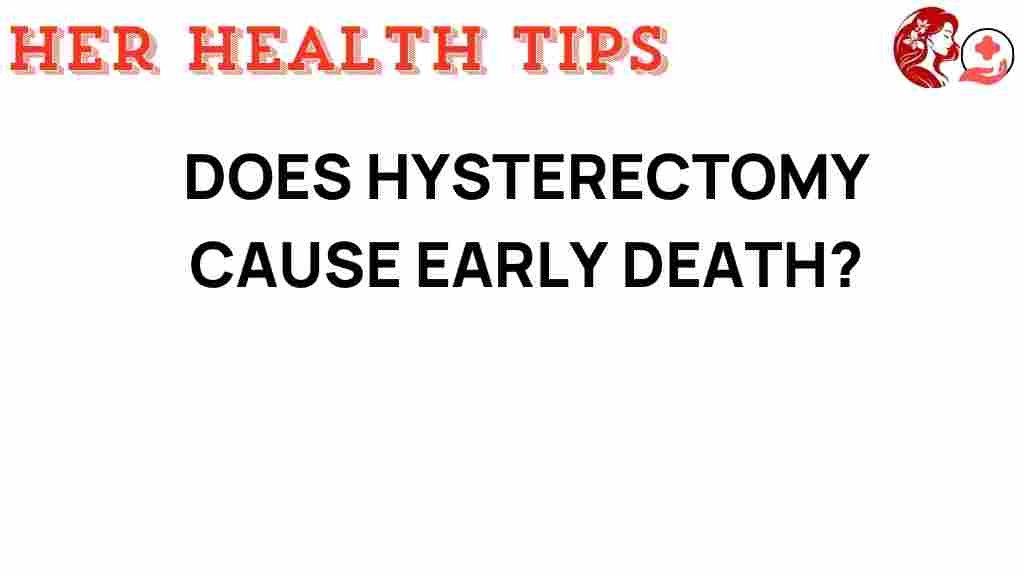Does Hysterectomy Lead to Early Mortality? Unraveling the Myths
Hysterectomy, a surgical procedure that involves the removal of a woman’s uterus, is often surrounded by a cloud of myths and misconceptions, especially regarding its long-term health impacts. One of the most alarming questions raised is whether this procedure is linked to early death. In this article, we will explore the relationship between hysterectomy and early mortality, analyze the risks associated with the surgery, and review relevant medical studies that reflect on women’s health outcomes post-surgery. By the end, we aim to present a clearer picture of how hysterectomy affects reproductive health and overall longevity.
Understanding Hysterectomy
Hysterectomy is performed for various medical reasons, including:
- Uterine fibroids
- Endometriosis
- Uterine prolapse
- Abnormal bleeding
- Certain cancers
This procedure can be complete (removing the uterus and cervix) or partial (removing only the uterus). While hysterectomy can provide relief from symptoms and improve quality of life, it’s essential to understand the potential risks and long-term health outcomes associated with the surgery.
Exploring Surgery Risks
Like any surgical procedure, hysterectomy carries inherent risks. Some of the common risks associated with this surgery include:
- Infection
- Bleeding
- Damage to surrounding organs
- Blood clots
- Hormonal changes (especially in younger women)
While these risks can lead to complications, it is crucial to differentiate between immediate surgical risks and long-term health consequences, including mortality rates.
Analyzing Mortality Rates
Several studies have attempted to assess the relationship between hysterectomy and early mortality. Research indicates that the mortality rates for women undergoing hysterectomy vary based on factors such as age, underlying health conditions, and the reason for the surgery. Key findings from medical studies include:
- Short-term mortality: Most studies show that short-term mortality following a hysterectomy is low, particularly in healthy women.
- Long-term mortality: A few studies suggest a potential increase in mortality risk among women who undergo hysterectomy compared to those who do not. However, these findings often account for pre-existing health conditions.
- Age factor: Younger women tend to have better health outcomes post-hysterectomy compared to older women.
For a deeper understanding of these studies, you can explore more detailed research at PubMed Central.
Medical Studies Overview
In examining the long-term health effects of hysterectomy, several pivotal studies have emerged:
- The Women’s Health Initiative: This large-scale study examined various health outcomes in post-menopausal women and found no significant link between hysterectomy and increased early mortality.
- Journal of the American Medical Association (JAMA): A study published in JAMA found that while hysterectomy may lead to certain complications, it does not significantly increase mortality rates when compared to women who undergo other forms of treatment.
- British Journal of Surgery: This journal published findings indicating that women who had undergone hysterectomy had similar or better health outcomes compared to those who had not undergone the surgery.
Impact on Women’s Health
Understanding the implications of hysterectomy on women’s health is crucial. Some potential impacts include:
- Menopausal Symptoms: Women who have their ovaries removed during hysterectomy may experience early menopause, leading to symptoms such as hot flashes and mood changes.
- Reproductive Health: Hysterectomy eliminates the ability to conceive, which can have psychological and emotional effects.
- Pelvic Health: Some studies suggest a risk of pelvic floor disorders after hysterectomy, although findings are varied.
Step-by-Step Process of Hysterectomy
Understanding what occurs during a hysterectomy can help alleviate fears surrounding the surgery:
- Consultation: A thorough consultation with a healthcare provider to discuss symptoms, other treatment options, and the risks associated with surgery.
- Pre-operative assessment: This may include blood tests, imaging studies, and a review of medical history.
- Surgery: The procedure may be performed via abdominal, vaginal, or laparoscopic methods, depending on the specific case.
- Recovery: Most women spend 1-2 days in the hospital and can expect to gradually return to normal activities over several weeks.
Troubleshooting Tips Post-Surgery
After a hysterectomy, some women may experience challenges. Here are some troubleshooting tips:
- Monitor Symptoms: Keep track of any unusual symptoms such as severe pain, excessive bleeding, or signs of infection.
- Follow-Up Care: Attend all follow-up appointments with your healthcare provider to monitor recovery.
- Support Groups: Consider joining a support group for emotional and psychological support during recovery.
- Healthy Lifestyle Choices: Maintain a balanced diet and engage in regular physical activity to promote overall health.
Conclusion
The relationship between hysterectomy and early mortality is complex and often misunderstood. While there are risks associated with the surgery, current medical studies suggest that hysterectomy does not significantly increase the risk of early death for most women, especially when compared to those who receive alternative treatments. Women’s health is multifaceted, and the decision to undergo a hysterectomy should be made with careful consideration of the potential risks and benefits. Ultimately, ensuring informed choices alongside regular healthcare consultations will lead to better health outcomes in reproductive health.
For further reading on women’s health and surgical options, visit Women’s Health Resources.
This article is in the category Reproductive and created by HerHealthTips Team
